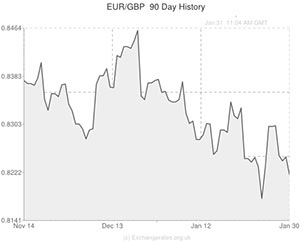
On Thursday the Euro put in a patchy performance against several of its most traded rivals as German inflation figures fell short of forecasts and added to mounting deflation concerns for the Eurozone.
The common currency extended declines against the Pound on Friday as UK consumer confidence achieved a six-year high and retail sales fell dramatically in Germany.
Instead of climbing by a modest 0.2 per cent in December, month-on-month, sales plummeted by 2.5 per cent.
Given that December is traditionally the busiest month of the year the result was particularly surprising and indicates that household confidence isn’t as robust as recent surveys would lead us to believe.
The figure is also a downside risk to German growth, quite concerning given that the nation has been largely responsible for driving the Eurozone out of recession.
Further Euro movement then occurred after Eurozone inflation data showed an unexpected decline in consumer prices.
Although economists had expected consumer prices in the currency bloc to advance by an annual 0.9 per cent, up from a reading of 0.8 per cent in December.
However, prices only climbed by 0.7 per cent.
This marks the fourth consecutive reading of under 1 per cent and means that inflation remains below half of the European Central Bank’s target.
In the opinion of economist Colin Bermingham; ‘While the growth outlook is improving for the currency bloc, the ongoing problems in the banking sector, which are manifested through ongoing credit contraction, will continue to act as a drag on both growth and inflation. This will put renewed pressure to act on the ECB’.
As today’s data increased the odds of the central bank having to cut rates beyond current record lows to shore up the Eurozone’s economy, the Euro edged lower against the Pound and US Dollar.
However, common currency declines were limited by the news that the Eurozone’s unemployment rate held at a revised 12 per cent in December, only slightly less than the record high of 12.1 per cent recorded in September.
Next week the Bank of England and European Central Bank rate decisions could be the main cause of movement in the EUR/GBP pairing. Both announcements will be taking place on Thursday.
Ahead of that, EUR/GBP movement could be triggered by services and manufacturing data for the Eurozone and UK.
Euro Exchange Rates
[table width=”100%” colwidth=”50|50|50|50|50″ colalign=”left|left|left|left|left”]
Currency, ,Currency,Rate ,
Euro, ,Pound Sterling,0.8218,
,Pound Sterling,0.8218,
Euro, ,US Dollar,1.3526,
,US Dollar,1.3526,
Euro, ,Canadian Dollar,1.5149,
,Canadian Dollar,1.5149,
Euro, ,Australian Dollar,1.5458 ,
,Australian Dollar,1.5458 ,
Euro, ,New Zealand Dollar,1.6624 ,
,New Zealand Dollar,1.6624 ,
US Dollar, ,Euro ,0.7393,
,Euro ,0.7393,
Pound Sterling, ,Euro,1.2169,
,Euro,1.2169,
Canadian Dollar, ,Euro,0.6611 ,
,Euro,0.6611 ,
Australian Dollar, ,Euro,0.6475 ,
,Euro,0.6475 ,
New Zealand Dollar, ,Euro,0.6019 ,
,Euro,0.6019 ,
[/table]

Comments are closed.